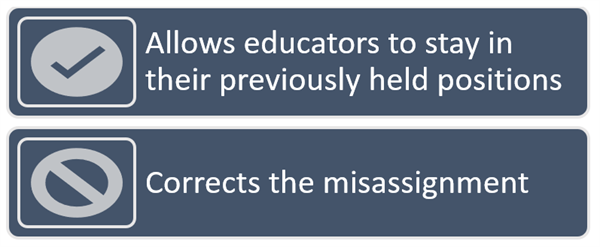What has Changed?
The table below describes which credential and assignment facets charter schools are subject to after the passage of the abovementioned legislation, and how they compare with traditional schools. A “yes” indicates that the LEA is subject to the credentialing, fitness, or monitoring requirements provided by state law, and a “no” signals exemption.
Setting or Scenario | Traditional Schools | Charter Schools Prior to January 1, 2020 | Charter Schools after January 1, 2020 |
|---|---|---|---|
CTC Professional Fitness evaluation required | Yes | No | Yes |
Included in Regular Assignment Monitoring | Yes | No | Yes |
General Education: Core/College Prep Curriculum | Yes | Yes | Yes |
General Education: Non-core/Non-College Prep Curriculum | Yes | No | Yes |
Special Education | Yes | Yes | Yes |
English Learner Services | Yes | Yes | Yes |
Career Technical Education | Yes | No | Yes |
Non-Classroom based Support/Service Assignments | Yes | No | No |
Assignment Flexibility
The legislation aligned certification and assignment monitoring requirements in all areas except for non-classroom based and service assignments. Note that English Learner, Special Education, and Core Curriculum/College Preparatory curriculum assignments were never exempt from certification requirements, though these assignments were not required to be monitored.
Education Code §44258.10 gives charter schools flexibility in assignments that were previously exempt from credentialing requirements (e.g. non-core/non-college prep courses). This statute provides that charter schools are not required to correct the misassignment of unqualified educators previously employed in these positions until July 1st, 2025. In order to be eligible for this flexibility, those educators must have been employed in their position at some point during or prior to the 2019-20 school year. These individuals cannot maintain the flexibility if they are:
- assigned to teaching a different subject; or
- begin teaching the same subject at a different school.
This assignment flexibility protects the educators from being removed from their positions. It does not, however, exempt the LEA from incurring a misassignment.

Therefore, to avoid incurring misassignments, MAs should work with charter schools to get these educators appropriately assigned prior to the 2025 date. We recommend communicating with your charter schools about:
- which assignments are eligible for this flexibility;
- the misassignment implications of using this flexibility; and
- the available Misassignment Correction Options.
Service/Non-Classroom Based Assignments
Furthermore, Education Code §44258.9(b)(6) provides that misassignments can only be accrued for teaching positions in charter schools. However, the exemption for service positions only applies to Administrative, Pupil-Personnel, Health, Librarian, and other similar certificated services positions oriented outside of the classroom.
This does not apply to English learner services and Special Education instructional assignments; these positions are not exempt, and will be monitored.
When is a Credentialed Teacher Required?
Because credentialing requirements were less stringent in charter schools prior to this year, they may have used unconventional methods of staffing teaching assignments, including sending students to community-based businesses for instruction. For example, some charter schools may have sent students to attend dance academies for Physical Education instruction. Because of that, it may be unclear to them when a credentialed educator is required.
There are three things to consider when answering this question:
- The student receives a grade or credit for the course and/or;
- The course counts towards the required daily instructional minutes; and
- If either of the above are true, does a credential exist that covers the assignment’s subject or setting?
If the answer to the last question is “yes”, then Education Code §44001 provides that if certification requirements are established, then a certificated educator is required.
Volunteers and Docents
As well, some charters may have relied on volunteers or docents to instruct courses. Volunteers and docents are welcome in classrooms, as long as they are subject to the immediate supervision and direction of certificated personnel pursuant to Education Code §§45349 & 35021.
As well, their instruction on a subject in a classroom cannot satisfy assignment certification requirements. Misassignments depend solely on the teacher of record being appropriately certificated for the course’s content.
CALPADS Considerations
CALPADS Reporting
If a monitoring authority becomes aware of a misassignment that was not captured during CALPADS reporting, they have the ability to report the misassignment in CalSAAS using the MA Reported Misassignment feature.
Independent study
Some charter schools are also heavily based in independent study settings. They are able utilize Education Code §44865 to staff these assignments. However, because this is a new option, they may need your guidance to understand what counts as an Independent Study assignment and who is eligible to use the Local Assignment Options.
Courses indicated as independent study in CALPADS will be predetermined as §44865 by CalSAAS during monitoring. That is why we recommend discussing these assignments with your charters prior to monitoring to ensure your understanding aligns.
If you find a course that was determined this way during monitoring, but is a misassignment, you may also use the “Monitoring Authority Reported Misassignment Feature” to capture it.
If you have questions about a charter’s independent study assignment configurations, please refer to CDE’s Independent Study Department.
Charter Compliance Checklist
It is very important for charters to meet credentialing requirements. Education Code §47607(f)(4) provides that a charter may be revoked by the chartering authority if the chartering authority finds, through a showing of substantial evidence, that the charter school violated any law.
Therefore, we have created the following checklist for Monitoring Authorities to help their charters maintain compliance.
.png?sfvrsn=c28b72b1_10)
.png?sfvrsn=cd8b72b1_0)